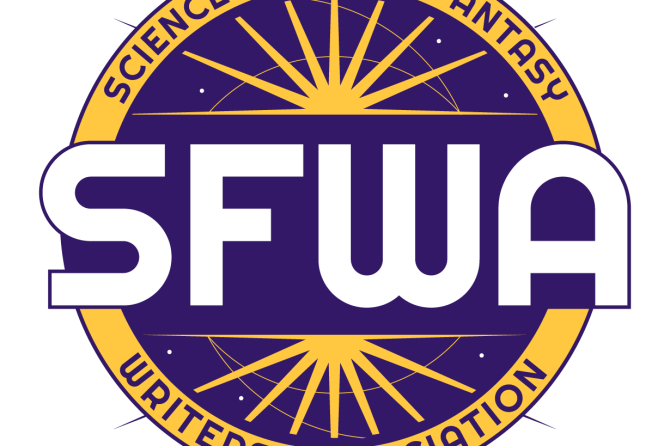 Please allow me this moment to Rant. Though this is my own personal opinion, I’m strapping on my robot boots and stepping up on this hijacked Amazing Stories soap box to vent about something that has been gnawing at me for quite some time now. As a reader, it can be bothersome if handled poorly. As a reviewer, it can put you in a compromising position.
Please allow me this moment to Rant. Though this is my own personal opinion, I’m strapping on my robot boots and stepping up on this hijacked Amazing Stories soap box to vent about something that has been gnawing at me for quite some time now. As a reader, it can be bothersome if handled poorly. As a reviewer, it can put you in a compromising position.
The trilogy, or in some cases, it may be referred to as the saga.
It comes in many shapes and forms, but in the end…well, that’s just it. It is the novel WITHOUT an END. It is that fretful literary continuation that has no defining ending.
I appreciate a fantastic cast of characters and a solid storyline. Throw in a complicated plot, and I will be drawn in as long as it is tightly written. But when the last page is turned, I expect a satisfying conclusion.
Case in point – a story like A Song of Fire and Ice by George R.R. Martin is a continuing saga of epic proportions, and unless you’ve just crawled out from under a rock, you also know that it is a marathon narrative. When I discovered the first book A Game of Thrones in the summer of 2000, the billing on the back cover read, “From a master of contemporary fantasy comes a novel of imaginative power unlike any you’ve ever encountered…” The third book in the saga was soon to be released in the fall, so I knew something was up and was all set to begin the long haul.
Even so, reviewing a book from this type of series is difficult. It is unfair to the overall bulk of the series by looking at such a small sample size as one book and unfair to the prospective reader looking for a comprehensive review. In hindsight, given the magnitude of the story, I find it ironic that the GRRM even book began with a prologue at all.
Okay, let’s accept that every tale has a backstory of some sort (that is unless it begins with the singularity big bang), and it is up to the author to determine what or how much of that history is necessary to reveal in order to earn credence to the rest of the story. And it goes without saying that on the other end of the journey (unless it ends with the narrator fading to the blackness of death), the tale will still go on whether it is told or not. This is where the success of the first publication might dictate the possibility of a returning novel. It is fantastic for both the author AND the fans who want more.
As a reviewer, starting a trilogy, or a saga or a series from the middle is complicated. I can review the book as a stand-alone work of literature and hope that the author leaves me enough backstory breadcrumbs to keep up. If done well, I should be able to pick up any book in the series and immediately follow the story in order to provide a thorough analysis of plot, setting and characters. But in many cases, this does not happen.
Why did that hobbit have that ring anyway? (Okay, in defense of Tolkien, I believe The Lord of the Rings was supposed to be one giant book, but was broken up by the publisher – but you get my point.)
Look at how Star Wars was handled (I know it was a film, but the literary connotations are the same and just used here as an example that most people might be familiar with). A New Hope was the fourth episode. I didn’t need the first three episodes to enjoy the story – sadly, this is still my opinion even AFTER the three episodes were made. A New Hope began with a brief prologue, followed by the adventure, and finally in the end, the Death Star was destroyed. Good. The End.
And then it went all wrong. I was happy to have the opportunity to revisit my favorite characters in The Empire Strikes Back, but it did not end after the credits rolled. What happened to Han? Vader is Lukes…Wha? If somebody began the saga with Return of the Jedi, would the scrolling prologue really make sense?
Though there have been many novels written in the Star Wars universe to date, a lot of them can stand alone because they tell individual stories. That’s good.
A bigger problem with “to-be-continued” volumes is the time lapse between publications. I recently reviewed the book Ink Mage by Victor Gischler. Originally sold as a “Kindle Series” and published gradually through monthly installments, it had the comfortable feel of the pulp classic cliffhangers. Yet, as each installment came, I could pick up the story where it left off.
A poor example of a “to-be-continued” type series would be The King Killer trilogy by Patrick Rothfuss. When I picked up the The Name of the Wind back in 2007, I was blown away by the brilliant prose and the large score of lifelike characters. The elegant writing seemed like a model example of poetic literature. I wished I could write like that.
And then, almost 700 pages later came the last page. I knew going in that it was only the first volume of The King Killer trilogy, so ending without a resolution was acceptable. But then came the wait. Four long years later, the second book The Wise Man’s Fear finally came out. By then, I had forgotten most of the characters and plot. My backlog of books to read became too large to go back and give it a second go. So the second book still sits on my shelf gathering dust, unread. And when (or if) the third volume ever makes it to print, I sadly doubt it will own it. The interest and time has waned.
Okay, as I step down from this soapbox, is it too much to ask that books have an ending? Or, if it must be a trilogy or saga, can I at least be warned in advance so that I can get the complete set – in a timely manner – before digging in?
To be continued… (See what I mean?)










I get what you’re saying. I personally have nothing against trilogies, sagas or series, but there are so many of them nowadays and a lot of the time there is a long wait in between. At least Tolkien wrote The Lord of The Rings as one master book and THEN split it up, so the wait between books was a matter for the publisher. But then again, a proper waiting period to get fans anxious and excited is not a bad way to go. As for years of waiting, if I am a fan of the book then I don’t want to wait. I get impatient. I realize that authors like GRRM want to spend time on other projects. That’s an admirable, writerly goal. However, don’t take too long.
I enjoy short stories and the rare stand-alone books, hate coming to the end of a first book only to find out it is a setup for a longer series.
Many books, especially by well known authors, need editing and drag in the middle. They would be better for being shorter and tighter books.